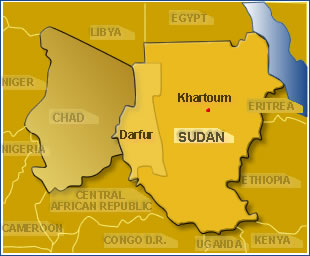Chad seeks IMF loan to cope with Darfur refugees.
 LIBREVILLE, Aug 4 (Reuters) — Chad said on Wednesday it is to seek a loan from the International Monetary Fund to help it support thousands of refugees fleeing fighting in neighbouring Sudan.
LIBREVILLE, Aug 4 (Reuters) — Chad said on Wednesday it is to seek a loan from the International Monetary Fund to help it support thousands of refugees fleeing fighting in neighbouring Sudan.
Finance Minister Ahmat Hawat Sakhine said after meeting IMF head Rodrigo Rato that refugees pouring in from Sudan’s Darfur region were putting a strain on the government’s ability to deal with pressing domestic concerns.
“It is creating enormous difficulties because there are more than 100,000 refugees and we are a very poor country,” Sakhine told reporters.
“This flow puts enormous difficulties on our population because we have to share even our food.”
An IMF staff mission was expected in the central African country within three weeks for initial discussions.
Sakhine met Rato in Libreville, the capital of Gabon, where the IMF chief is on the second leg of an African tour.
Aid workers say over the past year some 180,000 refugees from Darfur have crossed into eastern Chad.
The influx has pushed up prices and stretched meagre resources in a country whose eight million people, many of them subsistence farmers, get by on just $210 a year each.
The United Nations says the world’s worst humanitarian crisis is unfolding in western Sudan where fighting between rebels and Arab militias known as the Janjaweed has killed at least 30,000 people and uprooted 1 million.
France on Saturday flew a planeload of United Nations aid into eastern Chad and its ambassador in N’Djamena said 200 French soldiers would deploy to the Sudanese frontier to help the aid effort and watch out for incursions by the Janjaweed.
A deal with the IMF would help Chad negotiate a debt agreement with its foreign creditors under the Highly Indebted Poor Countries (HIPC) initiative and open aid flows from donors including the European Union.
The IMF has told Chad it must get its finances in order before the mission arrives. Regional banking officials say it is under enormous pressure as parts of its budget earmarked for reducing poverty are instead being spent on refugees.
The landlocked former French colony started pumping crude oil last year and the government received the first revenues from the new pipeline running across the country – $32 million – last month.
Revenues from the Doba heavy oil project are being monitored by an international committee which includes the World Bank, a scheme which has been touted as a possible model for ensuring that oil dollars get to the poor.
